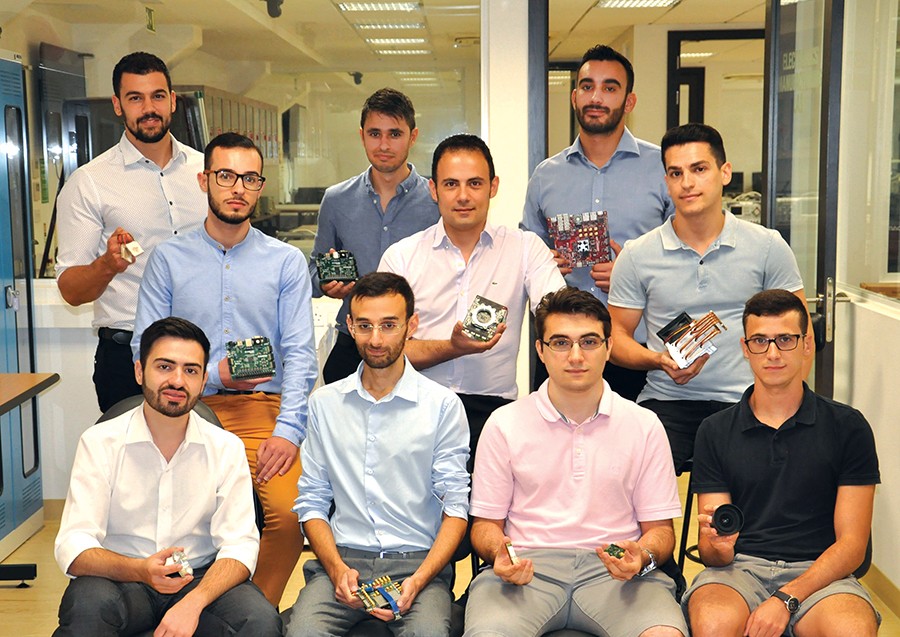With all the cranes strewn across the Maltese landscape, it appears that the construction industry is one of Malta’s primary economic drivers. But there are other, less polluting ways of generating income. Dr Ing. Marc Anthony Azzopardi discusses MEMENTO, the high-performance electronics project that could pave the way for a much-needed cultural shift in manufacturing.
Malta had a booming textile industry. Factories imported denim fabric which people sewed into jeans for relatively little pay. The garments were cheap to make and cheap to sell, and companies raked in the profits. Years later, the economics changed: cost of living on the island shot up and higher wages saw thin profits dwindle. The denim industry died in 2007. The lesson Malta should have learnt from this is that we need to add more value to the items we develop and produce, in order to make the effort sustainable and profitable. But the same mistakes are being repeated now. The local manufacturing industry is still suffering and underperforming in terms of growth and return on investment. It needs an intellectual renaissance.
This was the starting point for the MEMENTO Project.

Led by Dr Ing. Marc Anthony Azzopardi, the engineering team at the University of Malta created an advanced camera system capable of capturing synchronised high-speed video. It works like a ‘time microscope,’ allowing engineers, scientists, and enthusiasts to visualise super fast events, analyse them, and learn from them. Anything from ballistic impacts, to lightning bolt propagation, the inner workings of human cellular machinery, crack propagation in fracturing materials, and plasma physics experiments—these microsecond events can all be observed with MEMENTO.
‘The system is unusual in that it consists of multiple cameras connected via high-bandwidth fibre-optic links to a central real-time processing hub that also provides them with a precise time reference,’ explains Andre Micallef, MST Audio Visual Ltd. director and electronics designer. Going into more detail on the time reference, Azzopardi explains: ‘We need precise synchronisation to guarantee correspondence between the frames captured from different cameras—and we own the IP [Intellectual Property Rights].’ This is important when the video needs to be processed for 3D video reconstruction of the recorded event, for example.
The MEMENTO camera system can process the footage in real-time and export the raw video stream at full resolution and full frame rate. Applications for this tech are varied. The stream can be used for machine vision, allowing a fast robot to manipulate items around it. We see this in action on factory assembly lines where robot arms rapidly sort through items, discarding defective parts.
Taking things a step further, the fast video stream can be used to mimic human hand-eye coordination—visual servoing. With more cameras and low latency, the system can control complex operations. Think driverless vehicles on the highway, cruise missile control, satellite rendezvous operations, or keeping supersonic trains like the Hyperloop on track while levitating magnetically.
Some might say that the team has set its sights on lofty goals, but Azzopardi stands firm. Fully aware of the strengths and limitations of the Maltese context, the industry, and the University’s R&D setting, the team chose its target market segment carefully—speciality electronics—to ensure that the system is commercially competitive, while being environmentally sustainable and holistically beneficial to the local economy.

‘Engineers strongly influence the direction that their industries take and must therefore act responsibly. Our country is suffering under some heavy industries that do not generate enough income in relation to the environmental impact and the number of people they employ,’ says Azzopardi, pointing a finger at the construction industry.
‘Malta is also small. Other heavy industries like oil refining, metal smelting, or nuclear reprocessing cannot be accommodated without jeopardising all our lives in the process. We need to generate value by putting our minds to things rather than risking polluting everything we have. However, we also need to move away from producing items and services that are based on foreign IP, because that saps away from the value that can be added to our local economy,’ he adds.
With MEMENTO the focus is on producing high-end, high-value, and low-volume products built on a protected local IP and considerably more unpublished knowhow. ‘These kinds of products require extensive advanced engineering—highly trained minds—but relatively little in raw materials,’ Azzopardi notes.
‘We want to add €10,000 of locally generated intellectual value to every €1,000 of imported materials, and not the other way around, because that is the only way we can sustain good salaries in the future, without trashing the beautiful country we want to live in,’ adds Azzopardi. ‘That kind of decision must be taken at the project planning stage. MEMENTO is our first contribution in this direction—and won’t be the last.’
MEMENTO is a consortium between UM and MST Audio Visual Ltd. It secured close to €200,000 of funding, covering a three year period of intense development, from the Malta Council for Science & Technology through FUSION: The R&I Technology Development Programme.





Comments are closed for this article!